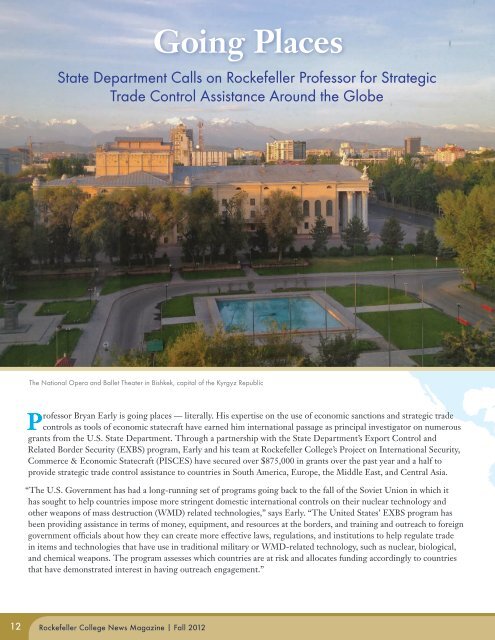RCnewsMagProof17forweb
RCnewsMagProof17forweb
RCnewsMagProof17forweb
You also want an ePaper? Increase the reach of your titles
YUMPU automatically turns print PDFs into web optimized ePapers that Google loves.
12 Rockefeller College News Magazine | Fall 2012<br />
Going Places<br />
State Department Calls on Rockefeller Professor for Strategic<br />
Trade Control Assistance Around the Globe<br />
The National Opera and Ballet Theater in Bishkek, capital of the Kyrgyz Republic<br />
Professor Bryan Early is going places — literally. His expertise on the use of economic sanctions and strategic trade<br />
controls as tools of economic statecraft have earned him international passage as principal investigator on numerous<br />
grants from the U.S. State Department. Through a partnership with the State Department’s Export Control and<br />
Related Border Security (EXBS) program, Early and his team at Rockefeller College’s Project on International Security,<br />
Commerce & Economic Statecraft (PISCES) have secured over $875,000 in grants over the past year and a half to<br />
provide strategic trade control assistance to countries in South America, Europe, the Middle East, and Central Asia.<br />
“The U.S. Government has had a long-running set of programs going back to the fall of the Soviet Union in which it<br />
has sought to help countries impose more stringent domestic international controls on their nuclear technology and<br />
other weapons of mass destruction (WMD) related technologies,” says Early. “The United States’ EXBS program has<br />
been providing assistance in terms of money, equipment, and resources at the borders, and training and outreach to foreign<br />
government officials about how they can create more effective laws, regulations, and institutions to help regulate trade<br />
in items and technologies that have use in traditional military or WMD-related technology, such as nuclear, biological,<br />
and chemical weapons. The program assesses which countries are at risk and allocates funding accordingly to countries<br />
that have demonstrated interest in having outreach engagement.”<br />
15


